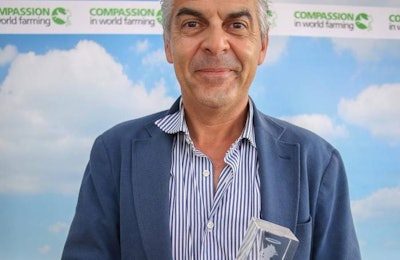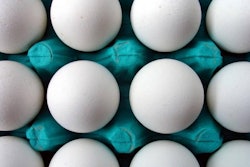
Andrea Costa, president of Italy’s Valverde Cooperativa Agricola and recipient of a Good Chicken Award, notes that higher welfare standards for the group’s broilers is bringing economic benefits as retailers look for higher standards. In many parts of the world, farm animal welfare, including poultry welfare, is shooting up the corporate agenda.
Where welfare may once have been a ‘nice to have’ at best, today companies from all sectors – retailers, producers, manufacturers, and food service companies – are paying serious attention to the issue, viewing it as a strategic necessity as well as an ethical imperative.
There’s no one ‘business case’ for companies to address farm animal welfare but, for many, the potential risks posed by exposure of poor practice in the media are paramount.
For others, taking a long-term view makes clear that higher welfare systems are a more future-proof investment than, for example, caged layers or other low-welfare farming systems that legislation could render obsolete within a few years.
Consumer demand
Consumers are a big part of the picture, and an important business driver. While stated concern does not always translate into purchasing patterns, concerns are beginning to filter through at the till, in particular when there is clear information available to enable an informed choice.
Eggs from higher welfare systems are leading the way here with the volume of cage-free eggs purchased by consumers in the U.K., for example, growing from 12 percent in 1994 to 48 percent in 2014, according to figures from the country’s Department for Environment, Food and Rural Affairs.
Investor pressure
Less obviously, perhaps, than consumers, investors are another key driver for companies to address farm animal welfare.
Investors are starting to consider the risks and opportunity posed by farm animal welfare and, in turn, are asking the companies in which they invest to ensure robust management of this issue.
The Business Benchmark on Farm Animal Welfare – supported by Compassion in World Farming, World Animal Protection, and Coller Capital - is a key tool for investors, providing an annual public ranking of 90 of the world’s largest food companies on their management, policy commitment and disclosure of farm animal welfare.
Public ranking and recognition is a well-known concept for corporate sustainability issues, but still fairly new in the field of animal welfare.
Airline KLM is a leader in this area - with animal welfare firmly on its change agenda.
Referring to its Good Egg Award, presented by Compassion earlier this year, the company said: “Winning this prestigious award perfectly fits in our ambition to retain the leading position on the Dow Jones Sustainability Index. We ranked first in the sector Transport for the sixth time this year and we headed the Airlines rankings for the 10th consecutive year.”
More than 41 Good Farm Animal Welfare Awards have been presented by Compassion this year, 20 of which were Good Egg Awards spanning retailers, manufacturers and food service companies from across the world, with a further four Good Chicken Awards being presented to some of the same businesses.
The awards are given to companies ensuring – or who commit to ensure, within a five-year period – higher welfare systems for the animals in their supply chain.
For laying hens, the Good Egg Award recognizes cage-free systems – barn, free-range or organic.
The Good Chicken Award requires companies to ensure a maximum stocking density of 30kg/m2, to provide enrichment to broilers in the form of natural light, straw bales, perching and pecking substrates, and to either use a slower-growing bird (maximum 50g/day), or to implement an active leg-health plan.
Cementing brand values
Aside from the prestige of recognition, companies see other benefits from moving to higher welfare supply. For many, it’s a question of brand values and integrity of sourcing.
Ferrero, for example, which won a Good Egg Award this year for being 100 percent cage free in its ingredients across its entire European operation, cites how animal welfare "contributes to quality, product safety and sustainability of supply."
KLM challenged Qizini, its supplier of sandwiches, to include chicken meat from a higher welfare system, as part of its integrity of sourcing plan (and to be in line with the Good Chicken Award).
Qizini supplies around 3.5m chicken sandwiches to KLM, so it was essential for the business to meet the brief.
It explored an opportunity to use meat from laying hens which had lived in the ‘Rondeel’ enriched barn system in the Netherlands and had come to the end of their laying life.
The hens typically finish laying at 76 weeks when they are slaughtered and the meat is exported for generic products such as soup.
Together, Qizini, Rondeel and food development company Kokreateur developed a meat product using the chicken meat from the ‘retired’ laying hens which was fully accepted under taste trials and which could be thinly sliced.
Now 80-90 percent of the end-of-lay hens from the Rondeel system (approximately 90,000 hens per year) are used by Qizini for KLM’s sandwiches and products for other customers.
Client satisfaction
Valverde, an Italian Cooperative, has been working toward higher welfare systems for its broiler chickens.
Costa describes the company’s journey: “Over four years ago with my company I started along a path aimed at improving the quality of life of my broilers. It is a long and sometimes complicated path, but it is surely more ethical, traditional and, above all, more humane.

Andrea Costa, president of Italy’s Valverde Cooperativa Agricola and recipient of a Good Chicken Award, notes that higher welfare standards for the group’s broilers is bringing economic benefits as retailers look for higher standards.
“Thanks to CIWF and their Good Chicken Award, I had the chance to become part of a stimulating working group.
“From an economic perspective, my policy has brought some advantages, also because, over the past few years, retailers and food service companies have started to look for higher poultry welfare suppliers. Furthermore, increased production costs can be compensated for by a revenue increase which, together with all the other motivations, is encouraging me to further proceed along this path.”
The Good Farm Animal Awards
Via The Good Farm Animal Welfare Awards program Compassion in World Farming works directly with major food companies, which are then awarded for their policies and commitments that result in positive impacts on farm animal welfare in their supply chain, by meeting a set of species-specific criteria.
The Good Egg Award, for example, in operation since 2007, recognizes companies that source cage-free eggs. The Good Chicken Award was introduced in 2010.
For more information, visit: www.ciwf.org.uk
Is welfare key for success in the global poultry market?

















